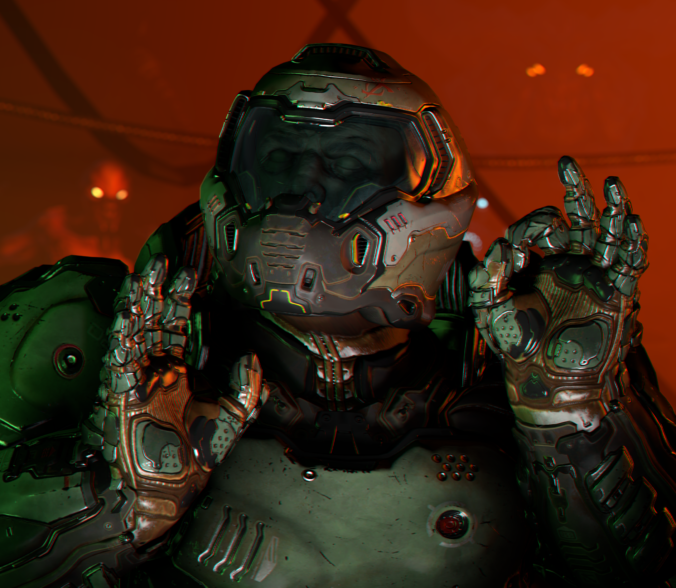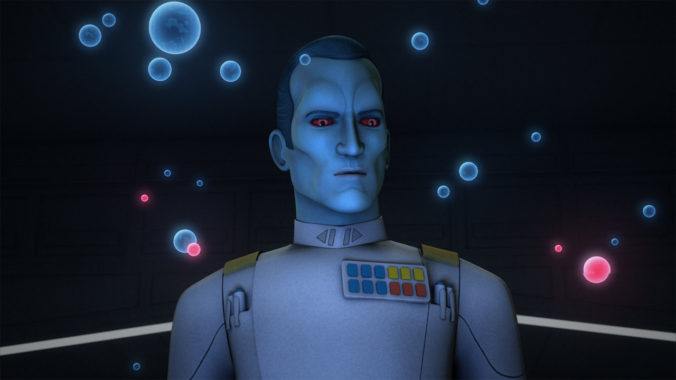I’ve been playing a lot of 2016’s DOOM lately. It hearkens back to the shooters of my youth. There’s a lot of catharsis in blasting demons with cool weapons and punching them in the face. The levels are large and they reward exploration with opportunities to customize your preferred blasting methods and adorable figurines. Perhaps most of all, for me, it showcases some fantastic storytelling and a wonderful way to leverage a silent protagonist.
The data logs you find on everything from the UAC’s methodology to data on the demonic minions you’re exterminating are very well-written. They, like the upgrade tokens, are fun bonuses. You can get all of the story you need, though, just from the brief in-game interactions and the Doomguy’s emoting. From the start, you get a sense of your avatar’s personality, without him uttering a single line of dialog.
In brief: explorers discovered an odd geological rift on Mars that was spewing a fascinating form of energy. The Union Aerospace Corporation’s CEO, Samuel Hayden — imagine the love child of Scott Pruitt and Elon Musk who downloaded himself into a cybernetic body — went into leveraging this resource to solve an energy crisis back on Earth. The EPA can’t file lawsuits if you’re exploiting a natural resource on another planet, right? Right. And Argent Energy rendered nuclear power and fossil fuels obsolete overnight. Hayden didn’t count on his head researcher being a covert cultist who discovered the energy was coming from Hell, and talked to demons about some sort of shady deal. Next thing you know, the UAC facility is getting worked over in the style of the colony from Aliens, and Hayden is trying to figure out how to maintain profits when all of his workers are dying horribly.
Enter the Doomguy.
Our hero hates demons with a fiery passion, and was put on ice after the last time he somehow made Hell worse, at least for its demonic denizens. He wakes up in one of the UAC’s isolated labs, find his iconic armor after smashing some zombified UAC folks with his bare hands, and realizes there’s a demonic invasion afoot. Hayden contacts him right away, figuring the Doomguy can clean the place up and get the energy production back on track.
It takes about 5 seconds for the Doomguy to communicate he’s not down for being a corporate stooge.
The monitor with which Hayden contacts our hero gets smashed to the floor. Moments later, in the elevator to Mars’s surface, Hayden tries again, giving some spiel through another monitor about “the greater good”. That monitor gets a solid, indignant punch.
I can’t tell you how much I love this.
Characterization in video games can be difficult, especially in shooters. Halo’s Master Chief is your stereotypically stoic one-man army in power armor. Most of the Call of Duty protagonists tend to be walking talking recruitment campaigns for modern military organizations. Other bullet-dispensing avatars whoop and wisecrack their way through the bad guys, kicking ass and looking for a fresh pack of bubble gum.
Doomguy’s just here to smash demons and give middle fingers to corporate America while he’s at it.
On top of the pretty obvious disdain he has for the UAC, the Doomguy’s got a sense of humor. When you find the collectibles, there’s a fantastic little sting of classic DOOM music as the hero looks the figurine over. But when you find one that’s the same coloration as your current incarnation, the Doomguy gives it a fistbump. The scion of anti-demon violence and masculine badassery fistbumps a figurine.
And then there’s this little Terminator 2 Easter Egg, when the Doomguy takes a bad step and falls into molten metal:
The developers could have easily just left the Doomguy as an angry psychopathic killing machine. But they didn’t. He has a sense of humor. There are glimmers of knowing self-awareness. And when confronted with the notion that smashing all of the UAC’s work will plunge the Earth into a new energy crisis, the Doomguy shows himself to be a person with conviction, weighing that reality with the fact that demonic invasions are literally the worst thing. Hayden doesn’t agree; the Doomguy doesn’t care. Demons are bad. Sure, making life difficult on Earth is bad, but it’s still life. Better to worry about the prices of your utilities than an Imp eating your face, right? Right.
Video games are mediums of visual storytelling. They’re made for showing, rather than telling. And 2016’s DOOM does this beautifully. I think that these moments, and the data logs, keep me playing just as much as the action and exploration. Fast-paced shooting is one thing; being compelled to see the next bit of story is icing on the cake. It’s a glorious storytelling experience on top of a visceral exercise in catharsis.
I love story-based games. My next solo gaming project is Witcher 3, which will be very different but, from what I understand, rich in its own storytelling. I’m just as invested in the lore of Overwatch as I am its game balance and being a better Reinhardt. But I’ll probably be coming back to DOOM now and again. There are harder difficulties, arcade modes, classic maps, challenges… there’s a lot there, and not just in terms of ammunition and well-designed enemies.
The ballad of the Doomguy is a work of pulse-pounding death metal punctuated by shotgun blasts and breaking bones, but its melody is one of those sprawling lyrical epics about one man standing against a tide of darkness. It’s Beowulf with a BFG.
And I am, as the kids say, so here for it.





